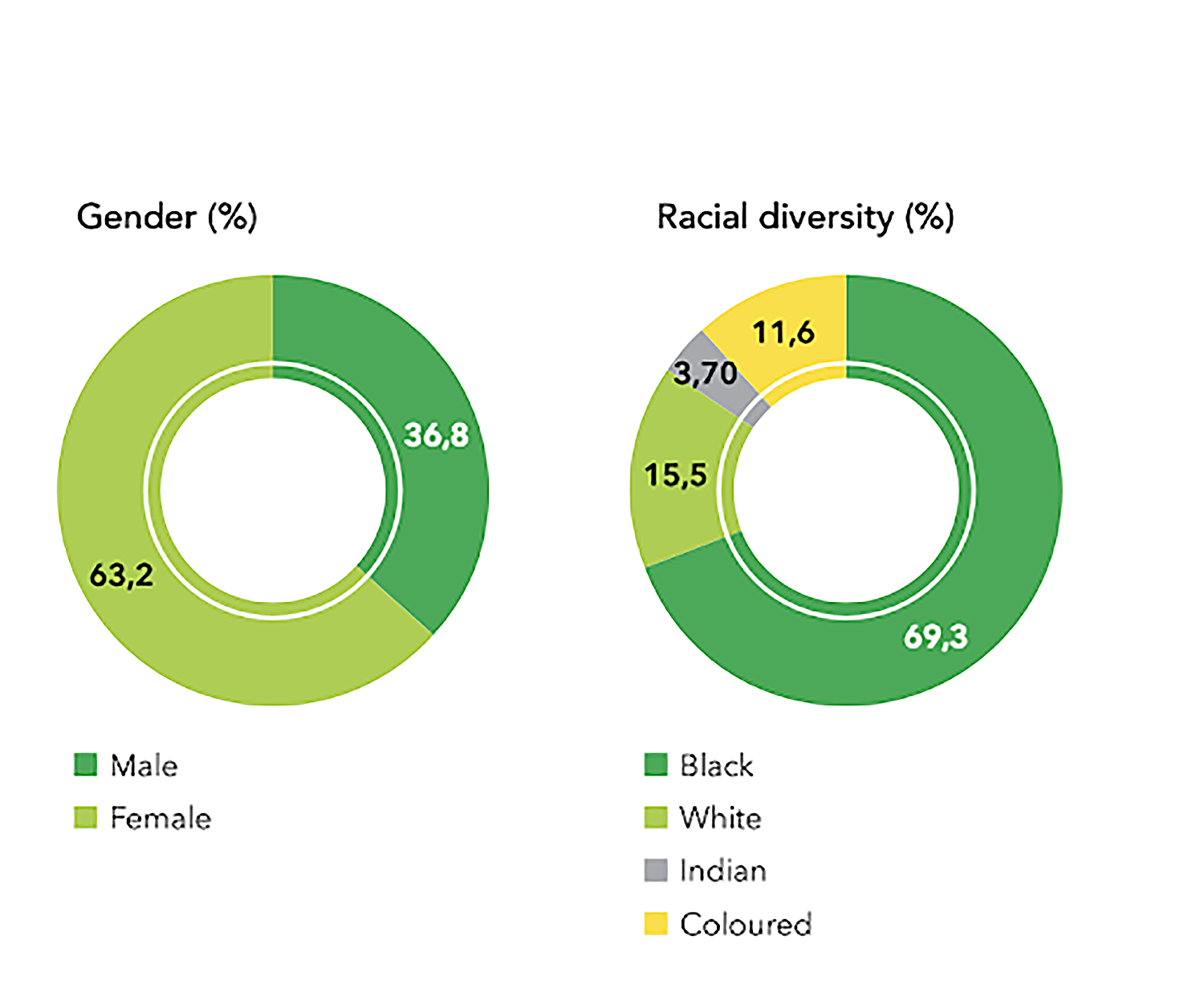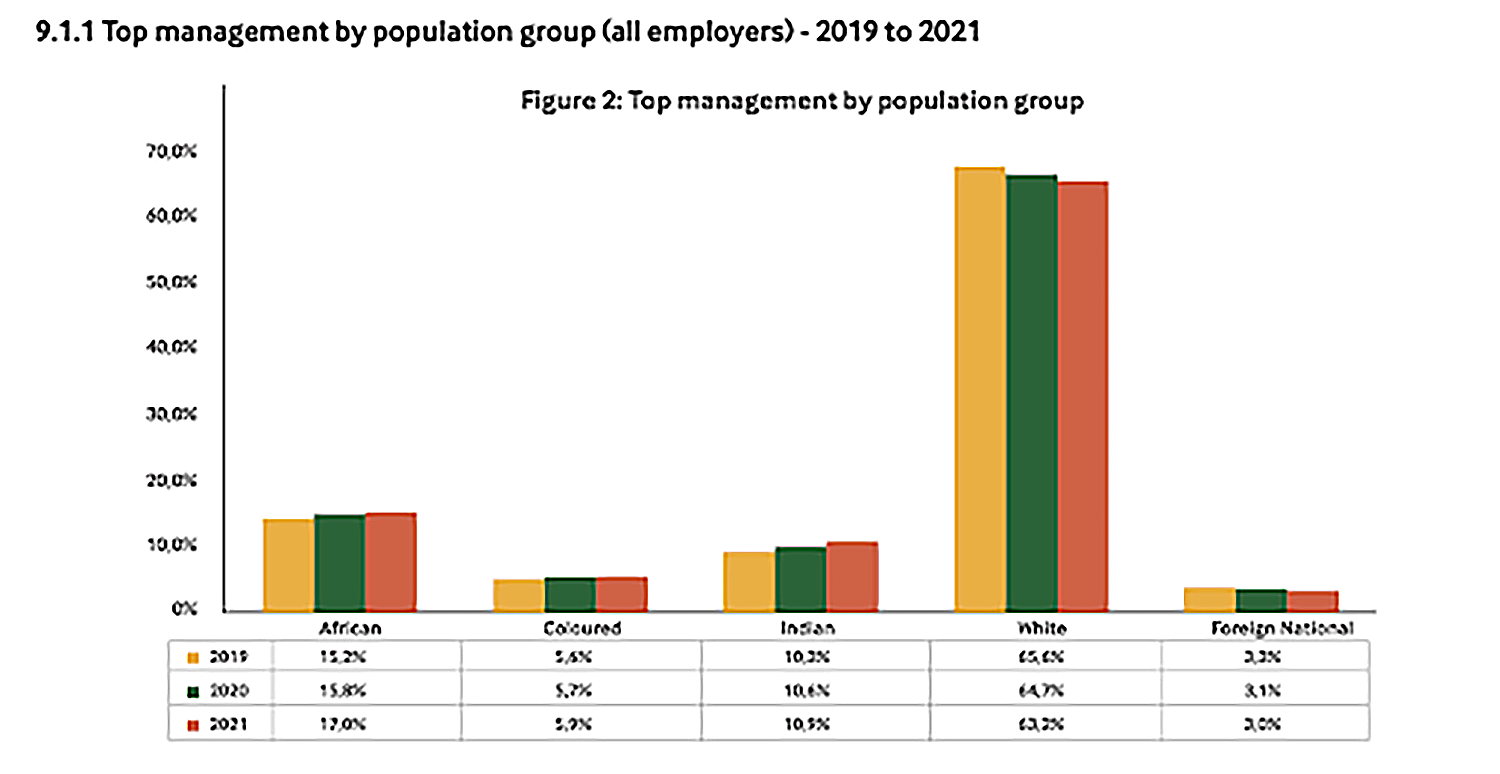EMPLOYMENT EQUITY
More SA companies may be forced to pause hiring and promoting white people

In the same month that South Africa marked 24 years of the Employment Equity Act being enacted, pharmaceutical retailer Dis-Chem found itself in a furore over its workplace transformation plan, which involves no longer employing white people. Amendments to an equity law might see many more companies forced to follow suit
It has been 24 years since South Africa’s government introduced a breakthrough law to eliminate discrimination and promote diversity in the workplace to level the playing field after 46 harmful years of apartheid.
On 12 October 1998, then president Nelson Mandela signed into law the Employment Equity Act, an instrument through which affirmative action and organisational diversity would be promoted to increase the economic participation of the black majority, women, people with disabilities and other designated groups.
The Employment Equity Act sparked fierce and polarising responses. In one corner, some companies embraced the new law because it was the only step towards redressing South Africa’s terrible past of racial injustice. Faces in corporate corridors slowly changed to mirror South Africa’s diverse, multicultural and multiracial society.
In the other corner, the act created tension among employers, who worried that too much affirmative action would leave few employment opportunities for white people. This cohort, it was feared, would see no future for themselves in corporate South Africa and end up leaving the country — contributing to the brain drain. This pushback against affirmative action and race-based policies persists today.
In the same month (October) that South Africa marked 24 years of the Employment Equity Act being in place, pharmaceutical retailer Dis-Chem found itself caught in a furore over its workplace transformation and diversity plan.

Ivan Saltzman, CEO of Dis-Chem Pharmacies, at the annual results presentation at the Waterfall Distribution Campus in Midrand in 2019. (Photo: Freddy Mavunda / Business Day)
Dis-Chem regressing on transformation
It all started on 19 September 2022 when Dis-Chem founder and CEO Ivan Saltzman issued a memo to staff, telling them that the retailer is performing badly and falling behind on its racial transformation targets at certain levels.
To address this worrying situation, Saltzman told Dis-Chem staff that the retailer would be pausing the recruitment of white people unless a special case was made to him and the head of human resources.
“We are growing at a fast rate and a few appointments other than white don’t cut it. It’s the ratio between white and black that counts. So, when no suitable black [person] is found, and a white [person] is appointed, we need several blacks just to maintain the status quo,” he wrote in the memo.
By mid-October, Saltzman’s memo had been leaked and distributed widely on social media.
The memo was polarising (much like when Mandela’s administration introduced the Employment Equity Act) — some celebrated that Dis-Chem’s transformation policies were in line with those of the country; others argued that it amounted to reverse racism and vowed to boycott stores.
Saltzman has since apologised for the memo, but only to the extent that it was “poorly worded”. Dis-Chem told Daily Maverick that it is standing by its decision to not prioritise white people for appointments.
“All appointments at junior, middle and senior management levels will require CEO approval, and appointments will be made based on merit and the necessity of giving employment preference to previously disadvantaged individuals.”
On the surface, Dis-Chem looks like a transformed company that reflects the demographics of the country. Dis-Chem has more than 20,000 employees, of whom 84% are classified as previously/historically disadvantaged (black, Indian and coloured) and 63% are female (see below).

Source: Dis-Chem’s 2022 annual report.
But Dis-Chem doesn’t offer a breakdown or specific figures about its transformation profile for junior and middle management levels, where important decisions are made.
At a senior management level (board and executive level), Dis-Chem is arguably regressing on being racially inclusive. The 10-member board has three women and four black people.
White males dominate at executive-level positions at Dis-Chem. This is the same pattern in the retail industry at companies including Mr Price, Truworths International, Pepkor (owner of Pep, Ackermans and others), Steinhoff, Cashbuild and Lewis.
So, Saltzman has a valid reason to be concerned about Dis-Chem’s employment equity profile — concerns that are compounded by labour law changes that are on the horizon. The changes will impact Dis-Chem and thousands of other companies.
Employment and Labour Minister Thulas Nxesi has pushed for the Employment Equity Act to be amended as he believes companies are not taking transformation and affirmative action objectives seriously. He says there isn’t a spirited commitment by companies to embrace the act, and those complying with it view it as an “annoyance and a box-ticking exercise”.
Nxesi’s views are supported by reports of the Commission for Employment Equity, which tracks compliance with the act by companies every year.
Companies are required to submit reports to the commission that detail, among other things, how many people they employ and segment them according to race, sex, skill levels, disability and other measures. And year after year, the commission’s report paints a dire picture of black people not being appointed to senior ranks at private and public sector entities.
On average, the commission receives 27,000 reports every year from companies that collectively employ 7 million people. An analysis by the commission shows that from 2019 to 2021, white people remain overrepresented in senior leadership positions (see below).

Source: Commission for Employment Equity annual report 2021–2022.
Visit Daily Maverick’s home page for more news, analysis and investigations
Law changes
More regulation is on the horizon as Parliament recently passed amendments to the Employment Equity Act, which are yet to be signed into law by President Cyril Ramaphosa.
The amendments, which are expected to come into force in September 2023, will bring about an important change. Nxesi will now have the power to regulate the compliance by companies with the act, and he can set employment equity/affirmative action targets for different industries.
The targets are yet to be determined by Nxesi in consultation with the Commission for Employment Equity, and various industries will be given at least 30 days to comment on the targets. Once the targets are determined, companies (except small ones that employ fewer than 50 people) will be required to regularly report on their compliance.
Gillian Lumb and Nadeem Mahomed from Cliffe Dekker Hofmeyr, which specialises in labour law, said amendments to the act are aimed at strengthening requirements for equitable representation of people from designated groups (historically disadvantaged groups of people based on race, gender and disability) at all occupational levels in the workforce.
Nxesi also wants companies that are not serious about transformation to be punished. He said errant companies won’t be able to do business with the state or receive contracts. Companies might also risk being slapped with fines equivalent to 10% of their annual turnover or sales.
These fines also apply to companies that fail to meet broad-based black economic empowerment objectives — another law related to affirmative action. In Dis-Chem’s case, its non-compliance might translate to a fine of more than R3-billion based on its most recent annual turnover of R30.4-billion.
Dis-Chem’s Saltzman has described the potential sanction as “a real threat”.
A Johannesburg-based labour analyst and policymaker argued that a punishment mechanism won’t work because institutions that are meant to track non-compliance — such as the Commission for Employment Equity and the Black Economic Empowerment Commission — remain underfunded by the government, lack compliance-related skills and have been weakened over time.
“Without strong institutions of accountability, we will have another 24 years of no-to-slow transformation. The painful legacy of apartheid will keep thriving,” said the analyst. DM168
This story first appeared in our weekly Daily Maverick 168 newspaper, which is available countrywide for R25.




















 Become an Insider
Become an Insider
May I suggest an alternative? The government deregulates the economy and gets out of the way, so with economic growth, EE is no longer a zero-sum game. And we fix the education system so disadvantaged people can compete fairly in the workplace.
Couldn’t have said it better myself!
I’m appalled at how racist this proposal to marginalised white ( and competent) employees is. No better than policies under apartheid. This ANC governments failure to create opportunities for everyone, no matter the colour of their skin says everything about their short sightedness ,their personal greed and inability to organise a piss up in a brewery!
Blame a dysfunctional education system “Government = ANC”
No qualifications no top management positions
Aha just change the law: More regulation will solve the problem
Absolutely.. More regulations by a dysfunction system.. Woopie QED…
“The targets are yet to be determined by Nxesi in consultation with the Commission for Employment Equity, and various industries will be given at least 30 days to comment on the targets.”
We are democracy. Industry should not be given 30 days to comment; they should be involved in the drawing up the amendments. These bureaucrats have no idea of what is possible and what is not.
No amount of heavy-handed government threats and slapping about will change the fact that after 24 years of constant state interference in employment practices the country is on its knees; that we have 35% unemployment rate, and that more youngsters will never find a job than ever before; and a debilitating policy of cadre-deployment. This is caused by race-based policies that might have sounded like a good idea in the nineties, but in retrospect should be clear to the blindest of ideologues that it has not worked. Seems to me Salzman should be changed. If his company is not working, he identifies whites as his problem?! What kind of logic is that?
Pharmacists score some of the highest immigration points in places like the UK, Canada, Aus and New Zealand so…. goodbye the white kids in their final year at SA universities and to the black kids who just want to to be able to turn on the lights !!
For employers it is essential to find applicants who meet job requirements. Ist’s up to the government to provide free general and professional education for all. Additionally large companies should provide special training. Small businesses depend on what the labour market has to offer. Everyone should be encouraged to take advantage of opportunities for further education. If such principles are common knowledge in a democratic society, there ist no need for quota laws.
The vast majority of the companies that file returns are probably white-owned and the percentages in senior positions represent the owners/ investors/entrepreneurs. The media keep trotting out these numbers without actually interrogating the data. The key policy here seems to be that since many companies have white owners, young white people must be denied employment in South Africa. Only in SA will they throw away the few skills they have.
This is a clear invitation to white youth and middle age to pack up and go. The economy will collapse soon enough anyway. The only qualification for any job is ability and knowledge. Why don’t SAA put air hostesses in the captain’s seat?
An equal opportunity policy doesn’t have to be racist. Thanks to Mbeki’s Africanist diatribe, things went wrong. I support transformation but one cannot deny two facts: skilled people left the country in droves believing they would be discriminated against, and the areas where transformation was most successful like Eskom and local government, are in a state of collapse. And yet the ANC refuses to rethink this policy: they are ideological extremists in that facts never change their perspective.
There are several weasel words that have crept into common usage. “previously disadvantaged” means primitive, “fair discrimination” means revenge, BEE is reverse racism. Question, what was the economy before 1870? Where were the golden fields of maize and wheat? The Universities ? paved roads? potable water, dams and irrigation? Having got hold of the largest African economy with the best infrastructure our race-obsessed comrades have systematically dismantled the gift. Now these geniuses want to dictate to private companies what skin colour and in what ratio the employees must be. BBE is discrimination pure and simple. Somebody take it to the Constitutional Court. What is the legal definition of “African”? etc?
Agree.